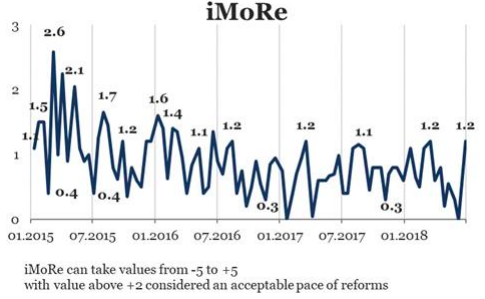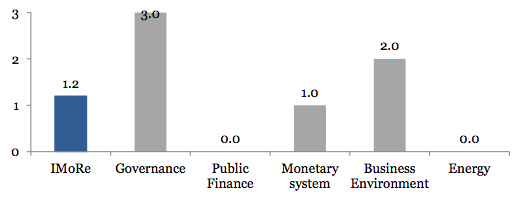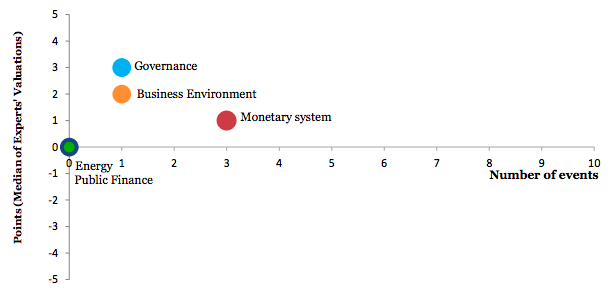For the period June 4 – June 17, iMoRe index was 1.2 points. The major event of the round is the law on High Anti-Corruption Court.
Reform Index is +1.2 points for the period from June 4 – June 17, 2018. Positive developments were recorded in legislation regarding governance, the monetary system and the business environment.
Chart 1. Reform Index dynamics

Chart 2. Reform Index and its components in the current round

The major event of the release
Law on High Anti-Corruption Court, +5.0 points
Judicial reform has to change the judicial system. In June 2016 a law on the judicial system and the status of judges was adopted. It simplified the system of courts and introduced new principles for the selection of judges. The four-level system of justice was replaced by three levels: local courts, appellate courts and new Supreme Court.
Renovation of the judicial system in accordance with the new principles is a long process. At the same time, the capacity of the judicial system significantly influences the progress of anti-corruption reform.
The creation of the National Anti-Corruption Bureau (NABU) and the Specialized Anti-Corruption Prosecutor’s Office (SAPO) provided opportunities for investigating cases of corruption of top officials and representation of these cases in the courts. However, corruption cases are often stuck there.
In order to ensure a fair consideration of corruption cases, the Supreme Anti-Corruption Court needs to be created without waiting for the completion of the reform of the entire judicial system. By law, the judicial system and the status of judges determine the basic principles of its formation. However, a number of issues related to its activities and the selection of judges had to be defined in a separate law.
It raised a fierce discussions around the issues of competitive selection of judges, in particular, the role of the High Qualification Commission of Judges and international experts. The position of civil society provided for the possibility of imposing the right of VETO by international experts on a particular candidature. Such a position was not supported by the critical mass of deputies in the Parliament, but supported by international partners of the country.
As a result, a compromise position was reached, which was documented in Law 2447-VIII of 07/06/2018.
In accordance with the law on the judicial system, the selection of judges will be carried out by the High Qualification Commission of Judges. Also, in order to assist the High Qualification Commission of Judges of Ukraine in establishing the eligibility criteria for the criteria of integrity, a Public Council of International Experts was formed.
At the initiative of at least three members of the Public Council of International Experts, the question of the eligibility of any candidate for the criteria of integrity may be raised. A decision whether a candidate meets such criteria may be approved by a majority of the members of the High Qualification Commission of Judges and the Public Council of International Experts, provided that at least half of the members of the Public Council of International Experts voted for him. If the commission does not recognize that the candidate meets the criteria, he will stop participating in the competition.
The court will be formed within the next 12 months and may commence work after the appointment of 35 judges.
Chart 3. Value of Reform Index components and number of events

(Please see other charts on the website)
Reform Index aims to provide a comprehensive assessment of reform efforts by Ukraine’s authorities. The Index is based on expert assessments of changes in the regulatory environment in five areas:
- Governance
- Public Finance
- Monetary system
- Business Environment
- Energy
For details please visit reforms.voxukraine.org
Attention
The author doesn`t work for, consult to, own shares in or receive funding from any company or organization that would benefit from this article, and have no relevant affiliations



